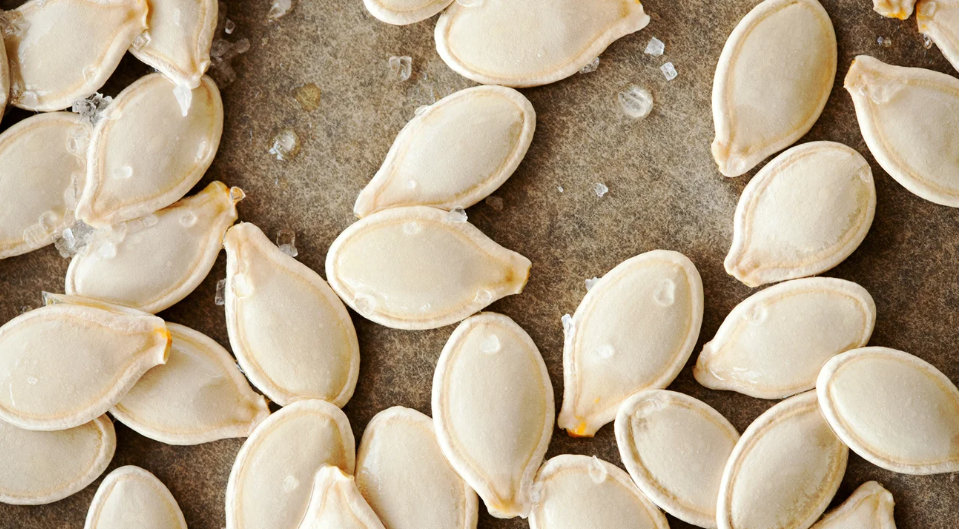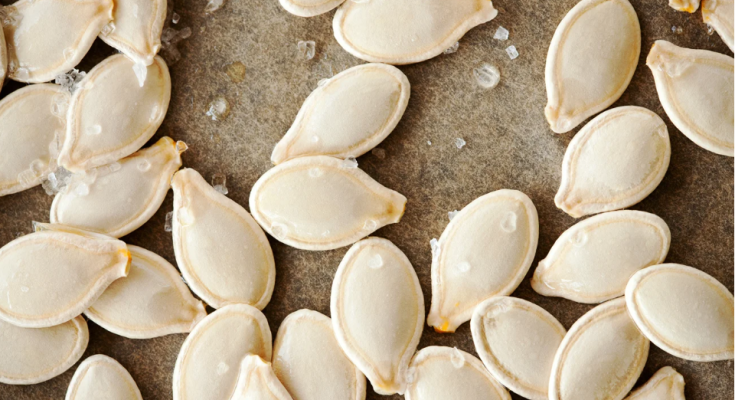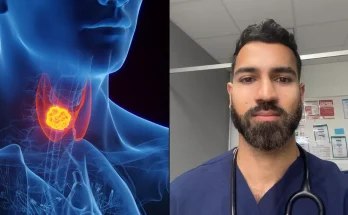Pumpkin seeds are highly nutritious and may be associated with health benefits, including improved fertility, better heart health, and enhanced blood sugar control.
 1. Full of valuable nutrients
1. Full of valuable nutrients
Pumpkin seeds are also known as “pepitas,” a Mexican Spanish term.Unlike the hard white seeds from a carving pumpkin, most pumpkin seeds bought at the supermarket don’t have a shell.
These shell-free seeds are green, flat, and oval.
1 ounce (oz), or 28 grams (g), of shell-free pumpkin seeds has roughly 160 calories, which are mainly from fat and protein (1Trusted Source).
In addition, a 1-oz (28-g) serving contains the following nutrients (1Trusted Source):
- Carbs: 3 g
- Protein: 8.6 g
- Fat: 14 g
- Fiber: 1.7 g
- Manganese: 56% of the Daily Value (DV)
- Copper: 42% of the DV
- Magnesium: 40% of the DV
- Phosphorus: 28% of the DV
- Zinc: 20% of the DV
- Iron: 14% of the DV
In addition to the nutrients listed above, pumpkin seeds also contain some antioxidants and small amounts of potassium, riboflavin, and folate (1Trusted Source).
SUMMARYPumpkin seeds are rich in antioxidants, iron, zinc, magnesium, and many other nutrients. 1 oz (28 g) contains about 160 calories.
2. High in antioxidants
Pumpkin seeds are rich in antioxidants like flavonoids and phenolic acids. They also contain small amounts of vitamin E and carotenoids (2Trusted Source).
Antioxidants can reduce inflammation and protect your cells from harmful free radicals. For this reason, consuming foods rich in antioxidants can help protect against many diseases (3Trusted Source).
It’s thought that the high levels of antioxidants in pumpkins seeds are partly responsible for their positive effects on health.
In one older study, pumpkin seed oil reduced inflammation in rats with arthritis without side effects, whereas animals given an anti-inflammatory drug experienced adverse effects (4Trusted Source).
SUMMARYPumpkin seeds are full of antioxidants that may help protect against disease and reduce inflammation.
3. Linked to a reduced risk of certain cancers
Some research suggests that pumpkin seeds may contain plant compounds that could help protect against cancer growth (5Trusted Source).
In fact, a 2012 observational study found that eating pumpkin seeds was associated with a reduced risk of breast cancer in postmenopausal women (6Trusted Source).
Other older studies suggest that the lignans in pumpkin seeds may play a key role in preventing and treating breast cancer (7Trusted Source).
Furthermore, one test-tube study found that pumpkin seed extract had the potential to slow down the growth and spread of prostate cancer cells (8Trusted Source).
SUMMARYSome evidence suggests that pumpkin seeds may help prevent certain types of cancer.
4. Improve prostate and bladder health
Pumpkin seeds may help relieve symptoms of benign prostatic hyperplasia (BPH), a condition in which the prostate gland enlarges, causing problems with urination.
Several studies in humans found that eating these seeds reduced symptoms associated with BPH (9Trusted Source, 10Trusted Source).
In a 2021 study, pumpkin seed oil consumption was able to reduce symptoms and improve quality of life in 73 people with BPH. Additionally, though pumpkin seed oil was not as effective as a prescription medication, it was associated with fewer negative side effects (11Trusted Source).
Further research suggests that taking pumpkin seeds or their products as supplements can help treat symptoms of an overactive bladder.
One older study in 45 people with overactive bladders found that taking 10 g of pumpkin seed oil extract daily improved urinary function (12Trusted Source).
SUMMARYPumpkin seeds may reduce symptoms of benign prostate enlargement and an overactive bladder.
5. Very high in magnesium
Pumpkin seeds are one of the best natural sources of magnesium, a mineral that is often lacking in the diets of many Western populations.
In the United States, around 48% of adults have a magnesium intake below the recommended daily amount (13Trusted Source).
Magnesium is needed for more than 600 chemical reactions in your body. Adequate levels of magnesium are also important for (14Trusted Source, 15Trusted Source, 16Trusted Source, 17Trusted Source, 18Trusted Source):
- controlling blood pressure
- reducing heart disease risk
- forming and maintaining healthy bones
- regulating blood sugar levels
SUMMARYPumpkin seeds are rich in magnesium. Healthy magnesium levels are important for your blood pressure and blood sugar levels, as well as heart and bone health.
6. May improve heart health
Pumpkin seeds are a good source of antioxidants, magnesium, zinc, and unsaturated fats, all of which may help keep your heart healthy (1Trusted Source).
Human and animal studies have also shown that pumpkin seed oil may reduce blood pressure and cholesterol levels, two important risk factors for heart disease (19Trusted Source, 20Trusted Source).
One older, 12-week study in 35 postmenopausal women found that pumpkin seed oil supplements reduced diastolic blood pressure by 7% and increased HDL (good) cholesterol levels by 16% (21Trusted Source).
Other research suggests that pumpkins’ ability to increase nitric oxide generation in your body may be responsible for its positive effects on heart health (5Trusted Source).
Nitric oxide helps expand blood vessels, improving blood flow and reducing the risk of plaque growth in your arteries (22Trusted Source).
SUMMARYNutrients in pumpkin seeds may help keep your heart healthy by reducing blood pressure and increasing good cholesterol.
7. Can lower blood sugar levels
Some older animal studies have shown that pumpkin, pumpkin seeds, pumpkin seed powder, and pumpkin juice can reduce blood sugar (23Trusted Source, 24Trusted Source).
One study in healthy adults found that those who consumed meals containing 65 g (about 2 oz) of pumpkin seeds had lower blood sugar levels after a high carb meal (25Trusted Source).
Interestingly, the high magnesium content of pumpkin seeds may be responsible for its positive effect on diabetes.
One large observational study found that people who consumed the highest amount of magnesium had a 15% lower risk of developing type 2 diabetes than those who consumed the lowest amount over a 28-year period (26Trusted Source).
Still, more research is needed to confirm these beneficial effects of pumpkin seeds on blood sugar levels.
SUMMARYPumpkin seeds may help reduce blood sugar levels in people with type 2 diabetes. However, more research is needed.
8. High in fiber
Pumpkin seeds are a great source of dietary fiber. In fact, shelled seeds provide 1.7 g of fiber in a single 1-oz (28-g) serving (1Trusted Source).
A diet high in fiber can promote good digestive health (27Trusted Source).
In addition, high fiber diets have been associated with a reduced risk of heart disease, type 2 diabetes, and obesity (28Trusted Source).
SUMMARYWhole pumpkin seeds are a good source of fiber. Diets high in fiber are associated with many health benefits, including a reduced risk of heart disease, diabetes, and obesity.
9. May improve sperm quality
Low zinc levels are associated with reduced sperm quality and an increased risk of infertility in males (29Trusted Source).
Since pumpkin seeds are a rich source of zinc, they may improve sperm quality.
Interestingly, evidence from one animal study found that supplementing with pumpkin seed oil and vitamin E improved sperm quality and reproductive performance in roosters (30Trusted Source).
Pumpkin seeds are also high in antioxidants and other nutrients that can contribute to healthy testosterone levels and improve overall health (31Trusted Source).
Together, all these factors may benefit fertility levels and reproductive function, especially in males.
SUMMARYThe high zinc content of pumpkin seeds may help improve sperm quality and male fertility.
10. May help improve sleep
If you have trouble sleeping, you may want to eat some pumpkin seeds before bed. They’re a natural source of tryptophan, an amino acid that can help promote sleep (32Trusted Source).
According to a 2014 study, consuming at least 1 g of tryptophan daily is thought to improve sleep (33Trusted Source).
However, note that you would need to eat around 6 oz (170 g) of pumpkin seeds to achieve the needed amount of tryptophan (1Trusted Source).
Pumpkin seeds are also an excellent source of magnesium. Adequate magnesium levels have also been associated with better sleep, according to some observational studies (34Trusted Source).
Some studies have found that taking a magnesium supplement could improve sleep quality and decrease the amount of time it takes to fall asleep in older adults with insomnia (35Trusted Source, 36Trusted Source).
However, more research is needed.
SUMMARYPumpkin seeds are a good source of tryptophan and magnesium, both of which help promote good sleep.
11. Easy to add to your diet
If you want to experience the benefits of pumpkin seeds, they’re easy to incorporate into your diet.
In many countries, they’re a popular snack that can be eaten either raw or roasted and salted or unsalted.
Besides eating them on their own, you can add them to smoothies, Greek yogurt, and fruit bowls.
You could incorporate them into meals by sprinkling them into salads, soups, or cereals. Some people use pumpkin seeds in baking, as an ingredient for sweet or savory bread and cakes.
However, as with many seeds and nuts, they contain phytic acid, which can reduce the bioavailability of some nutrients you eat (37Trusted Source).
If you eat seeds and nuts regularly, you may want to soak or sprout them to reduce their phytic acid content (37Trusted Source).
SUMMARYPumpkin seeds can be easily incorporated into your diet as a snack or ingredient in meals or baking.
The bottom line
Pumpkin seeds are highly nutritious and packed with powerful antioxidants.
Eating them can help solve dietary deficiencies and may protect against various health problems.
In fact, pumpkin seeds have been shown to improve heart health, blood sugar levels, fertility, and sleep quality. They may even protect against certain types of cancer.
In addition, their rich nutrient content may provide other health benefits, such as improved energy, mood, and immune function.
What’s best, they can easily be added to your diet, allowing you to reap their many positive effects.




Your insights are very valuable.
This article is a fantastic resource. Your detailed explanations and practical advice are greatly appreciated.
This is such a detailed and insightful post. I really appreciate the effort you put into explaining everything so clearly. It’s made a big difference in my understanding of the topic.
This post is exactly what I was looking for. You’ve addressed all the questions I had and provided clear, actionable advice.
Your articles are always so helpful.